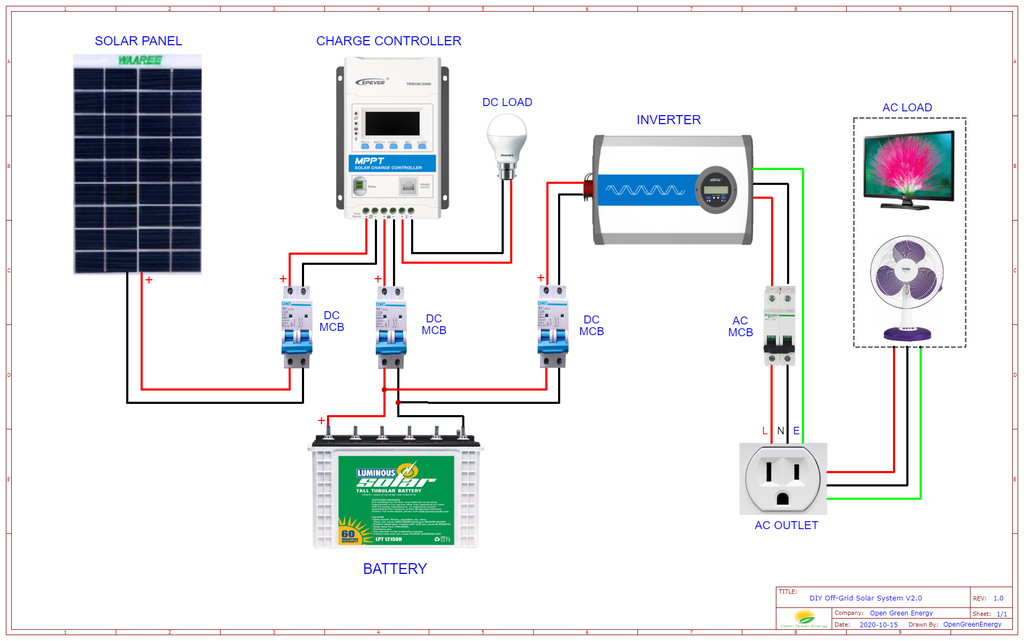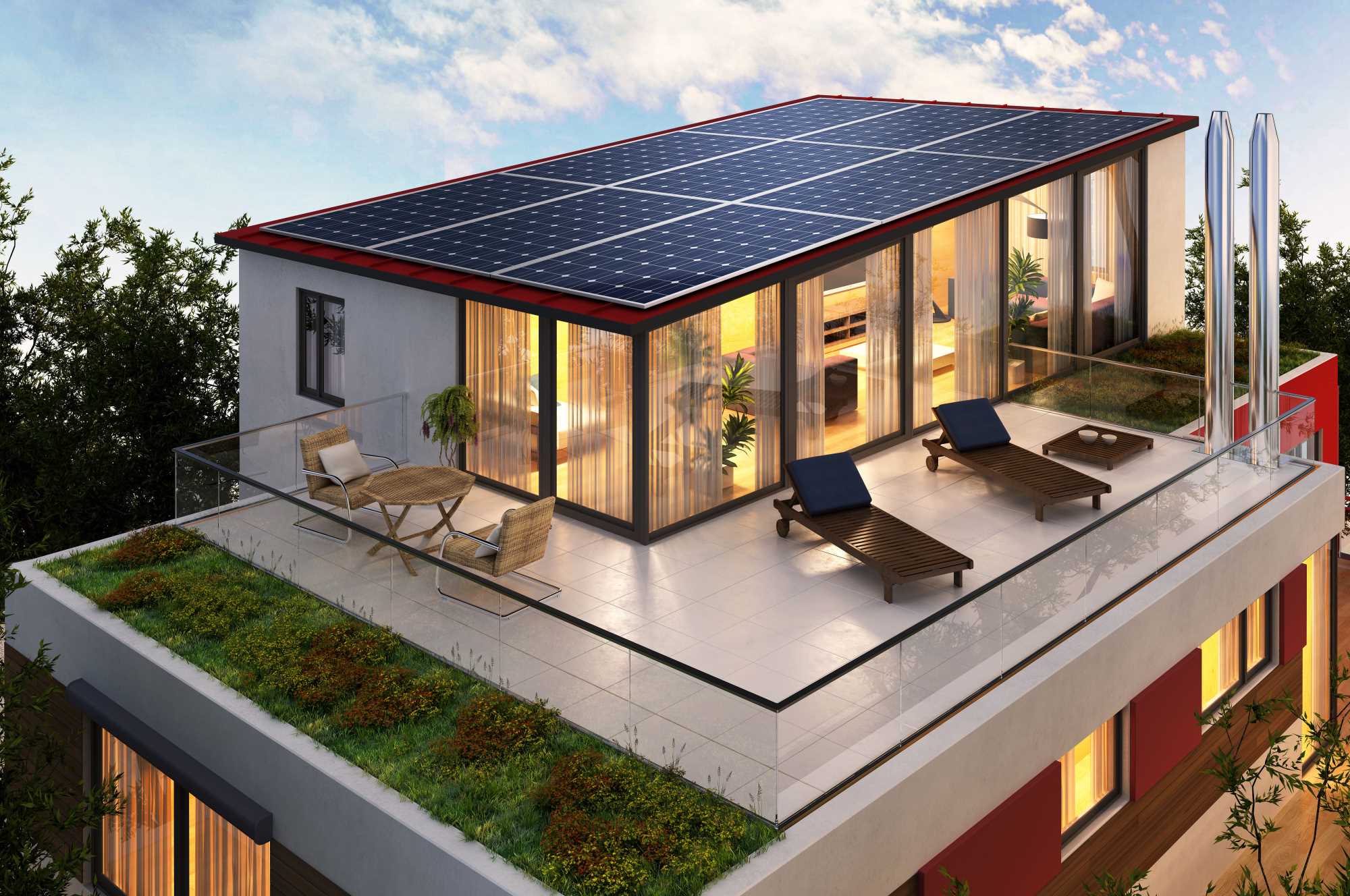“Off-grid solar power system wiring for home”
An off-grid solar power system allows you to generate and store your own electricity, providing independence and energy security. However, designing and installing an off-grid solar power system requires careful planning and attention to detail, particularly when it comes to wiring. In this article, we will delve into the world of off-grid solar power system wiring for homes, exploring the key components, wiring requirements, and best practices to ensure a safe and efficient installation.
Introduction to Off-Grid Solar Power Systems
An off-grid solar power system consists of several key components, including:
- Solar Panels: These convert sunlight into direct current (DC) electricity.
- Charge Controller: This regulates the flow of energy from the solar panels to the battery bank, preventing overcharging and ensuring the battery bank is properly charged.
- Battery Bank: This stores excess energy generated by the solar panels for later use.
- Inverter/Charger: This converts DC power from the battery bank into alternating current (AC) power, which is usable in the home.
- Wiring and Electrical Connections: This is the backbone of the system, connecting all the components together and ensuring safe and efficient energy transfer.
Wiring Requirements for Off-Grid Solar Power Systems

When designing an off-grid solar power system, it’s essential to consider the wiring requirements to ensure safe and efficient operation. The following are some key wiring considerations:
- Voltage and Current Ratings: The wiring system must be designed to handle the maximum voltage and current ratings of the system. Typically, off-grid solar power systems operate at 12, 24, or 48 volts DC.
- Wire Sizing: The wire size must be sufficient to handle the maximum current flow, taking into account the length of the wires and the temperature rating of the insulation.
- Insulation and Protection: Wires must be properly insulated and protected from the elements, including sunlight, moisture, and extreme temperatures.
- Grounding and Bonding: A proper grounding and bonding system is essential to ensure the safety of the system and prevent electrical shock.
- Disconnects and Overcurrent Protection: Disconnects and overcurrent protection devices, such as fuses or circuit breakers, must be installed to protect the system from overloads and short circuits.

Wiring Components for Off-Grid Solar Power Systems
The following are some common wiring components used in off-grid solar power systems:

- Solar Panel Connectors: These connect the solar panels to the charge controller and are typically rated for outdoor use.
- DC Wire: This is used to connect the solar panels to the charge controller, and the charge controller to the battery bank.
- Battery Interconnects: These connect the batteries in the battery bank together, allowing them to function as a single unit.
- Inverter/Charger Cables: These connect the inverter/charger to the battery bank and the AC loads.
- AC Wire: This is used to connect the inverter/charger to the AC loads, such as lights, appliances, and outlets.
Best Practices for Off-Grid Solar Power System Wiring
To ensure a safe and efficient off-grid solar power system wiring installation, follow these best practices:
- Hire a Licensed Electrician: If you’re not experienced in electrical wiring, hire a licensed electrician to design and install the system.
- Use High-Quality Components: Use high-quality wiring components, such as solar panel connectors, DC wire, and battery interconnects, to ensure reliability and durability.
- Follow Manufacturer Instructions: Follow the manufacturer’s instructions for each component, including wiring and installation requirements.
- Use Proper Wire Sizing: Use proper wire sizing to prevent overheating and ensure efficient energy transfer.
- Test the System: Test the system thoroughly before energizing it, to ensure all components are working correctly and safely.
Safety Considerations for Off-Grid Solar Power System Wiring
When working with electrical systems, safety is paramount. The following are some safety considerations to keep in mind:
- Electrical Shock: Be aware of the risk of electrical shock when working with electrical systems, and take necessary precautions, such as wearing insulating gloves and using non-contact voltage testers.
- Fire Risk: Be aware of the risk of fire when working with electrical systems, and take necessary precautions, such as keeping the area clean and free of flammable materials.
- Proper Grounding: Ensure the system is properly grounded to prevent electrical shock and ensure safe operation.
- Regular Maintenance: Regularly inspect and maintain the system to prevent wear and tear, and ensure safe and efficient operation.
Conclusion
Off-grid solar power system wiring for homes requires careful planning and attention to detail to ensure safe and efficient operation. By following the guidelines outlined in this article, homeowners can design and install a reliable and efficient off-grid solar power system that meets their energy needs. Remember to hire a licensed electrician if you’re not experienced in electrical wiring, and follow best practices, such as using high-quality components, proper wire sizing, and testing the system thoroughly. With proper design and installation, an off-grid solar power system can provide energy independence and security for years to come.
Additional Resources
For more information on off-grid solar power system wiring, consult the following resources:
- National Electric Code (NEC): The NEC provides guidelines for electrical wiring and safety standards.
- International Association of Electrical Inspectors (IAEI): The IAEI provides resources and training for electrical inspectors and installers.
- Solar Energy Industries Association (SEIA): The SEIA provides resources and guidelines for solar energy installations, including off-grid systems.
- Local Building Codes and Regulations: Consult local building codes and regulations for specific requirements and guidelines.
By following the guidelines outlined in this article and consulting additional resources, homeowners can design and install a safe and efficient off-grid solar power system that meets their energy needs and provides energy independence and security.


